|
|
|
Sort Order |
|
|
|
Items / Page
|
|
|
|
|
|
|
| Srl | Item |
| 1 |
ID:
110803
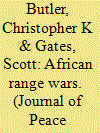

|
|
|
|
|
| Publication |
2012.
|
| Summary/Abstract |
This article examines the effect of climate change on a type of armed conflict that pits pastoralists (cattle herders) against each other (range wars). Such conflicts are typically fought over water rights and/or grazing rights to unfenced/unowned land. The state is rarely involved directly. The rangeland of East Africa is a region particularly vulnerable to drought and livestock diseases associated with climate change. To analyze the possible effects of climate change on pastoral conflict, we focus our analysis on changes in resource availability, contrasting cases of abundance and scarcity. The role of resources is further contextualized by competing notions of property rights, and the role of the state in defining property and associated rights. We employ a contest success function (CSF) game-theoretic model to analyze the logic of range wars. This CSF approach emphasizes the low-level, non-binary nature of raiding behavior between pastoralist groups over limited natural resources. A central contribution of this approach is that the logic of raiding behavior implies a positive relationship between resources and conflict. This positive relationship is supported by several studies of the rangeland of East Africa, but is generally dismissed by the literature on the 'resource curse'. This relationship is contingent on other factors examined in the model, producing the following results. First, the level of property rights protection provided by the state generally reduces conflict between pastoralist groups. Second, if property rights protection is provided in a biased manner, then conflict between pastoralist groups increases. Third, severe resource asymmetries between two pastoralist groups will induce the poorer group to become bandits (focusing their efforts on raiding and not producing), while the richer group raids in retaliation.
|
|
|
|
|
|
|
|
|
|
|
|
|
|
|
|
| 2 |
ID:
117597
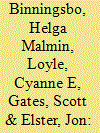

|
|
|
|
|
| Publication |
2012.
|
| Summary/Abstract |
This article introduces a new dataset on post-conflict justice (PCJ) that provides an overview of if, where, and how post-conflict countries address the wrongdoings committed in association with previous armed conflict. Motivated by the literature on post-conflict peacebuilding, we study justice processes during post-conflict transitions. We examine: which countries choose to implement PCJ; where PCJ is implemented; and which measures are taken in post-conflict societies to address past abuse. Featuring justice and accountability processes, our dataset focuses solely on possible options to address wrongdoings that are implemented following and relating to a given armed conflict. These data allow scholars to address hypotheses regarding justice following war and the effect that these institutions have on transitions to peace. This new dataset includes all extrasystemic, internationalized internal, and internal armed conflicts from 1946 to 2006, with at least 25 annual battle-related deaths as coded by the UCDP/PRIO Armed Conflict Dataset. The post-conflict justice (PCJ) efforts included are: trials, truth commissions, reparations, amnesties, purges, and exiles. By building upon the UCDP/PRIO Armed Conflict Dataset, scholars interested in PCJ can include variables regarding the nature of the conflict itself to test how PCJ arrangements work in different environments in order to better address the relationships between justice, truth, and peace in the post-conflict period.
|
|
|
|
|
|
|
|
|
|
|
|
|
|
|
|
| 3 |
ID:
107732
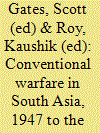

|
|
|
|
|
| Publication |
Surrey, Ashgate Publishing, 2011.
|
| Description |
xxx, 415p.
|
| Series |
Critical essays on warfare in South Asia, 1947 to the present
|
| Standard Number |
9780754629757, hbk
|
|
|
|
|
|
|
|
|
|
|
|
Copies: C:1/I:0,R:0,Q:0
Circulation
| Accession# | Call# | Current Location | Status | Policy | Location |
| 056223 | 355.020954/GAT 056223 | Main | On Shelf | General | |
|
|
|
|
| 4 |
ID:
090993


|
|
|
|
|
| Publication |
2009.
|
| Summary/Abstract |
Why do some armed civil conflicts last longer than others? Drawing on a contest success function model, we show that geographic factors (such as location, terrain, and natural resources) interact with rebel fighting capacity and together play a crucial role in determining the duration of conflict. Using precisely dated duration data in event history models and geographic data for the conflict location, we find that conflicts located at considerable distance from the main government stronghold, along remote international borders and in regions with valuable minerals last substantially longer. In addition, we find that rebel military capacity in its own right increases the prospects of a civil conflict ending within a short time period. Our findings imply that the distances an army must travel to project power, rebel fighting capacity, and characteristics of conflict region affect how a civil war is fought and who will prevail.
|
|
|
|
|
|
|
|
|
|
|
|
|
|
|
|
| 5 |
ID:
090998
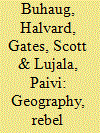

|
|
|
|
|
| Publication |
2009.
|
| Summary/Abstract |
Why do some armed civil conflicts last longer than others? Drawing on a contest success function model, we show that geographic factors (such as location, terrain, and natural resources) interact with rebel fighting capacity and together play a crucial role in determining the duration of conflict. Using precisely dated duration data in event history models and geographic data for the conflict location, we find that conflicts located at considerable distance from the main government stronghold, along remote international borders and in regions with valuable minerals last substantially longer. In addition, we find that rebel military capacity in its own right increases the prospects of a civil conflict ending within a short time period. Our findings imply that the distances an army must travel to project power, rebel fighting capacity, and characteristics of conflict region affect how a civil war is fought and who will prevail
|
|
|
|
|
|
|
|
|
|
|
|
|
|
|
|
| 6 |
ID:
155200
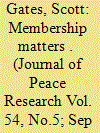

|
|
|
|
|
| Summary/Abstract |
Unable to attract enough voluntary recruits, many rebel groups rely on force to fill their ranks. Given that the group used force to compel individuals to join, a coerced conscript would be presumed unlikely to be loyal and would be expected to desert at the first opportunity. Yet, groups that have relied on coerced recruitment retain their members just as well as, if not better than, rebel armies that rely on voluntary methods of recruitment. This is a puzzle. How do rebel groups maintain allegiance and prevent desertion, especially if they rely on abduction to staff their ranks? A recruit can be forced to join a rebel group, but continuing to rely on coercion to enforce retention is too costly and not sustainable. These groups must find a way to reduce the costs of retention. The solution to this puzzle rests in the mechanisms of socialization that shape the allegiance of forcibly recruited soldiers. Socialization mechanisms are traced through three outcomes: compliance (or Type 0 socialization), role learning (Type I socialization), and norm internalization (Type II socialization). Integrating socialization theory and a rational choice analysis demonstrates that mechanisms that alter preferences through Type II socialization are effective in retaining recruits; the highest level of retention occurs when several mechanisms work in concert. Illustrative case studies of the Lord’s Resistance Army from Uganda, the Revolutionary United Front in Sierra Leone, the Maoists in Nepal, and the Liberians United for Reconciliation and Democracy (LURD) show that a reliance on child soldiers, group assets (pecuniary and non-pecuniary), organizational structure, and the nature of military contestation shape when different mechanisms are effective or not.
|
|
|
|
|
|
|
|
|
|
|
|
|
|
|
|
| 7 |
ID:
107731
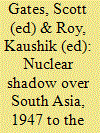

|
|
|
|
|
| Publication |
Surrey, Ashgate Publishing, 2011.
|
| Description |
xxviii,
|
| Series |
Critical essays on warfare in South Asia, 1947 to the present
|
| Standard Number |
9780754629764, hbk
|
|
|
|
|
|
|
|
|
|
|
|
Copies: C:1/I:0,R:0,Q:0
Circulation
| Accession# | Call# | Current Location | Status | Policy | Location |
| 056224 | 355.02170954/GAT 056224 | Main | On Shelf | General | |
|
|
|
|
| 8 |
ID:
175336
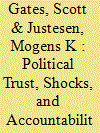

|
|
|
|
|
| Summary/Abstract |
How does armed conflict affect accountability and political trust in democratic governments? To answer this question, we present quasi-experimental evidence based on survey data which, coincidentally, were collected in the days surrounding an unanticipated violent attack by a rebel group in Mali. The chance occurrence of the attack five days into the survey demarcates respondents into two groups surveyed before and after the attack and allows us to examine how the attack affected approval of politicians and trust in political institutions. Our results show that people mainly attribute responsibility to the president and not to parliament or local government, while trust in institutions is largely unaffected. We also show that these effects are strongest in the region of the attack. These findings suggest that voters in new democracies are capable of attributing responsibility to individual politicians and governments while maintaining trust in the fundamental political institutions of democracy.
|
|
|
|
|
|
|
|
|
|
|
|
|
|
|
|
| 9 |
ID:
065780
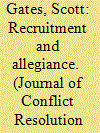

|
|
|
| 10 |
ID:
107730
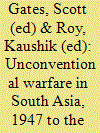

|
|
|
|
|
| Publication |
Surrey, Ashgate Publishing, 2011.
|
| Description |
xxx, 376p.
|
| Series |
Critical essays on warfare in South Asia, 1947 to the present
|
| Standard Number |
9780754629771, hbk
|
|
|
|
|
|
|
|
|
|
|
|
Copies: C:1/I:0,R:0,Q:0
Circulation
| Accession# | Call# | Current Location | Status | Policy | Location |
| 056222 | 355.02180954/GAT 056222 | Main | On Shelf | General | |
|
|
|
|
|
|
|
|
|